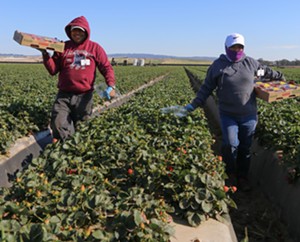Farm owners are afraid of being put out of business, while farmworkers and their families are full hope.
These feelings illustrate the harm in discussing whether to set a $26 minimum wage for farmworkers in Santa Barbara County, according to 4th District Supervisor Bob Nelson.
“You’ve kind of rolled out the grenade right there, and eventually it’s going to explode and somebody’s going to get hurt,” Nelson said during the Santa Barbara County Board of Supervisors’ Sept. 10 meeting. “I would prefer that we not have a living wage ad hoc committee.”

The discussion about whether to create a Farmworker Living Wage Temporary Ad Hoc Advisory Committee followed requests made by farmworkers and advocacy groups during public comment at the board’s Aug. 27 meeting. In the weeks that followed, Nelson said several farmers had reached out to him concerned for their future in the county.
“A formal ad hoc committee about a specific industry and a specific number, it lays down a policy pathway,” Nelson said. “Evaluation is usually a precursor to policy. These are people’s livelihoods at stake, not just the farmworkers—and especially the farmworkers.”
He questioned whether the board wanted to be in the business of setting minimum wage for a single industry and whether other industries would come to the county seeking similar treatment.
Third District Supervisor Joan Hartmann said she agreed that the “slippery slope” argument was something the board needed to think about, but she added that forming an ad hoc committee was a good way for the county to collect information and ideas in a public forum “so we can all share.”
“This is an opportunity for us to really delve into essential workers that are a part the biggest industry in our county to find out more information,” she said. “We’re eager to hear from all agricultural interests.”
Farmers and farm industry advocates spoke out during public comment against forming the committee and setting a $26 minimum wage.
Claire Wineman with the Grower-Shipper Association of Santa Barbara and San Luis Obispo Counties said the county needed to think about what a minimum wage like that would mean for sustainability of farms, local jobs, cost of food and living, and other hourly workers.
“We received another call from a member yesterday. A member is ending operations this year, citing the unsustainable costs of doing business in Santa Barbara County,” Wineman told supervisors.
Farmer Russell Doughty said that he has three full-time employees, a part-time employee, and a niece that works for him during the summer. If $26 an hour minimum wage started on Sept. 10, he’d have to get rid of one full-time employee, his part-time employee, and his niece, he said.
“If you really would like to help ag workers, make it an easier process for us to get ag housing,” he said. “If the family needs a three-bedroom house, that’s a $3,500 a month raise.”
CAUSE (Central Coast Alliance United for a Sustainable Economy) Community Organizer Daniel Segura said that farmworkers “are filled with hope,” at the thought that the county was listening to them and forming a committee to discuss the issue.
“What is not debatable is that wages for farmworkers are currently not enough,” he said.
Hartmann and 1st District Supervisor Das Williams said they would be open to broadening the scope of the ad hoc committee so they could learn more about the industry as a whole and better discuss the county’s cost-of-living issues. For example, farmworker housing would be important to include, Williams said.
“I would prefer to have a productive conversation,” he said. “I think that we should be examining this from multiple aspects.”
Ultimately, Nelson got his wish. Supervisors voted 5-0 to change the name and broaden the scope of the ad hoc committee to focus on agricultural worker conditions, which Williams and Hartmann will initially serve on.
“I have found this discussion, even to this point, very helpful,” Hartmann said. “I hadn’t realized how critical things are right now for agriculturalists.”
















